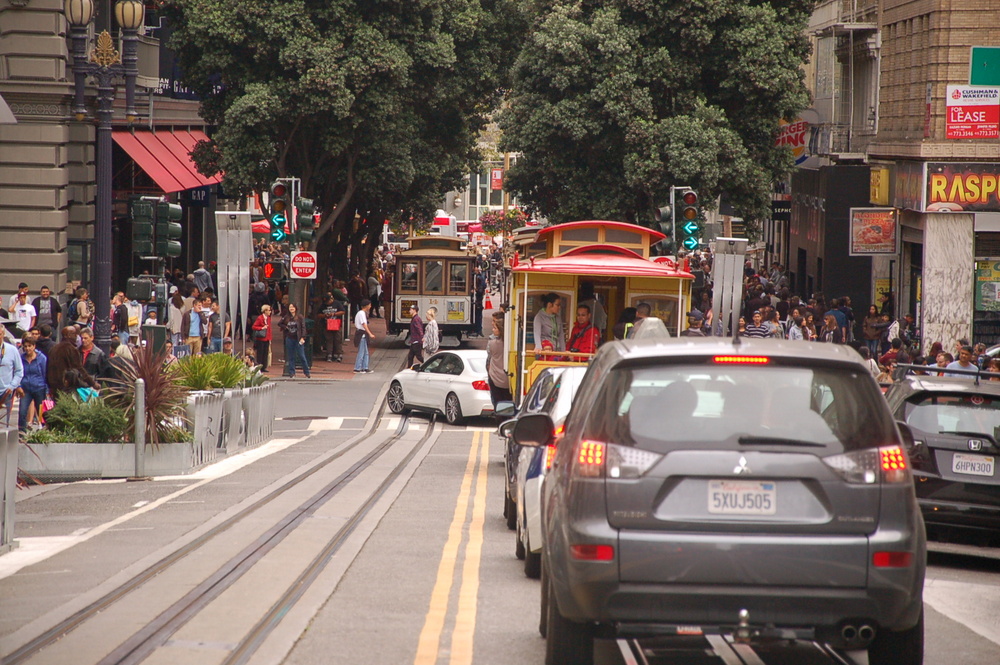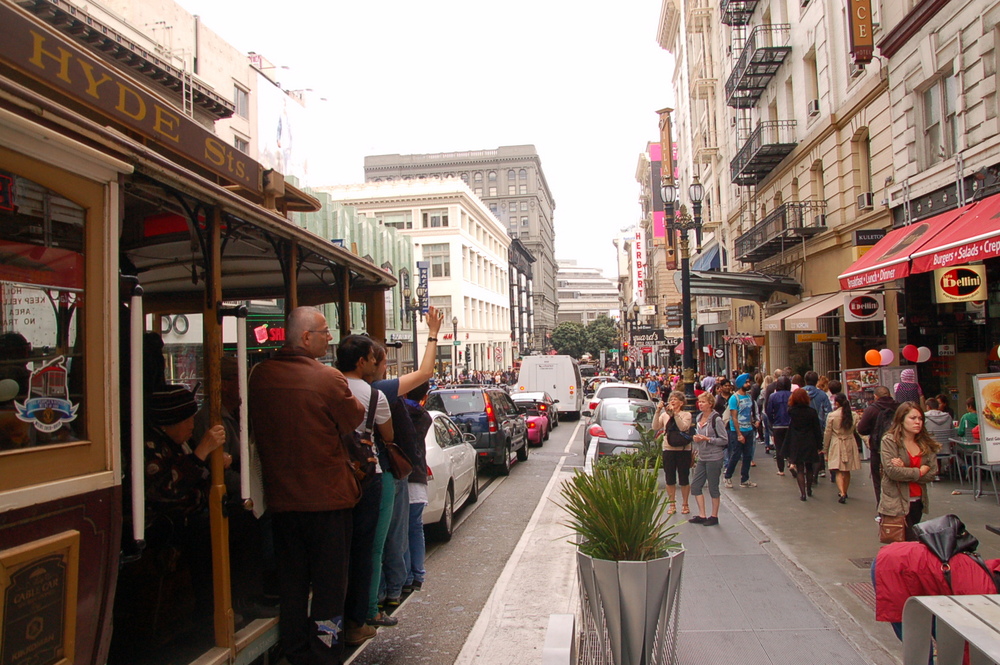The SFMTA has proposed making crowded, traffic-clogged Powell Street in Union Square a car-free street on a trial basis. Removing cars from the equation would make the street function better for pedestrians and cable cars on the blocks between Ellis and Geary Streets.
As we wrote last year, it makes little sense to have cars on Powell, which is seen as San Francisco’s gateway for visitors. On this two-block stretch, private car drivers routinely block bustling crosswalks, create stop-and-go traffic that damages Muni’s world-famous cable cars, and obstruct intersections in the path of the 38-Geary, Muni's busiest bus line.
The car-free trial has already been delayed due to the Union Square Business Improvement District's resistance to what it calls a "rushed" timeline and insistence on delivery vehicle access throughout the day.
The SFMTA's goal "is to have these changes in place before the 2015 holiday shopping season," with signs and paint installed in November, according to an agency flyer [PDF]. An engineering hearing is tentatively scheduled for October 2, and an SFMTA Board vote on October 20, but agency staff said the dates aren't confirmed.
The car-free trial was originally listed on an engineering hearing for August 14 but got tabled before the hearing was held.
Union Square BID Executive Director Karin Flood told Hoodline that "the group was concerned about the SFMTA 'fast-tracking' the changes without taking into account stakeholder concerns."
"We are open to the concept of making the area more pedestrian friendly but need to ensure that merchant loading/unloading needs are accommodated and that the timing is right," Flood wrote in an email to Streetsblog.
Under the proposal, during a 12-18 month trial phase, cars and delivery vehicles would not be allowed on Powell except between midnight and 5 a.m., when cable cars don't operate. This aligns with how "most business who responded" to an SFMTA survey already handle their deliveries. According to the SFMTA flyer, these businesses "indicated that they conduct their loading on a side street or during late night hours when the cable cars are not running."
In 2011, all car parking was removed from Powell south of Geary, with the installation of the Powell Street Promenade (also known as a "mega parklet"). The temporary installation has provided more room for people to sit or stand out of the way of foot traffic, though it didn't expand all of Powell's curb due to loading zones carved out at several spots. Private car drivers continue to park illegally in the loading zones, with little enforcement.
Powell's mega parklet is set to be removed next July with the expiration of a five-year contract with Audi, which funded and maintains it.
"So the city is exploring a permanent car-free design," said SFMTA spokesperson Robert Lyles. "This public space design would be both aesthetically appealing while balancing the needs of its primary users. SFMTA is acting first to improve safety while public funding can be identified or another private sponsor for improvements on one of San Francisco’s most iconic streets can be found."
If all of Powell's curb is eventually expanded, as the SFMTA envisions, the only place for delivery vehicles to park would be on the cable car tracks. But at the BID's insistence, the agency is considering 24-hour delivery vehicle access, not just during the hours when cable cars don't operate, said Lyles.
While cars consume a lot of space on Powell and clog the roadway, there aren't actually very many of them. "Peak traffic volumes on these two blocks of Powell are around 175 to 200 vehicles per hour, which is low even for urban streets," according to the SFMTA flyer. At the same time, more than "4,000 people per hour walk on Powell Street during the peak period, often overflowing into the street."
"All three intersections in the project area" have high rates of pedestrian injuries, Lyles noted, "with the most common issue being vehicles turning onto or off of Powell into pedestrians crossing the street."
"Anyone who walks along Powell knows that it's crowded, noisy, and could be a whole lot better," said Walk SF Executive Director Nicole Ferrara. The organization "fully supports a pedestrian/transit only street in the heart of San Francisco's tourism and commercial district. Not only is it better for business, it's better for people's safety, health and livability."
Adding to the urgency of making Powell car-free is the wear and tear on cable car infrastructure. According to the flyer, getting cars off Powell "decreases the chance that a runaway cable car will injure people and cause damage."
In 2012, cars were diverted from nearby Stockton Street (which is also ripe to become car-free) for construction of a Central Subway station. Even though Powell makes little sense as a detour route, many drivers use it, creating stop-and-go movements for cable cars.
"The SFMTA is experiencing a nearly 50 percent increase in cable strand breaks since 2000, with half of that increase occurring in the past five years," said Lyles. "This accelerated wear on the cable has serious safety implications."
Merchants are expected to see sales boosts from a more inviting street for walking, replicating the results that businesses around the city have seen when pedestrian space is improved. Most recently, business boomed in Fisherman's Wharf after parking was removed and to make a more pedestrian-friendly street.
Still, many merchants resist such street changes based on the mistaken belief that most customers arrive by car. An SF Chronicle column from C.W. Nevius fed right into that perception today, with anecdotes from a few Union Square merchants who say the Central Subway construction has hurt business. But other merchants over the years have said they've benefited from the reduced car traffic.
Fortunately, the SFMTA seems more emboldened to move forward with ideas like the Powell Street project since Tom Maguire became the director of Sustainable Street last October. The Powell proposal would complement turn restrictions that were recently enacted on most of lower Market Street, moving SF's downtown shopping hub closer to a car-free zone.








